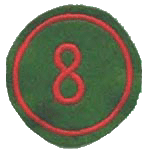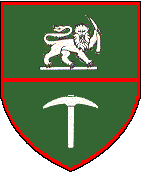Rhodesia Regiment  Army Home Page
Army Home Page Site Home Page
Site Home Page  Contact Us
Contact Us
The unit was established on the
13th February, 1961.
The first Commanding Officer
was Lt. Col. AS. Stokes, MLM,MC,MM., who took up command on the 21st
March, 1961.
The Battalion was classified as a reserve unit whose personnel had an initial commitment of 7 days continuous training and one 8 hour administration parade. The personnel were in the age group 28 - 45 and the initial call-up in 1961 included 1939/45 war veterans and even one father / son relationship, and many members of the reserve strength of the 1st Field Regiment. Southern Rhodesia Artillery - mostly senior NCO's.
The first training camp was in May 1961 when over 1000 men reported and the first task was to organise the Battalion on the ground. Regular staff was available on a scale not subsequently seen to assist with that and training. Training was concentrated on basic skills and weapon handling - .303's, Bren Guns and Sten Guns, and an introduction to COIN, ATOPS and aid to civil power.
After the first training camp the age limit was reduced to 42, the Artillerymen transferred to their proper reserve and the personnel generally re-organised in the interest of efficiency.
In October 1962 the Battalion again went into a camp of training, when after a few days, Operation Mackerel started and the unit was tasked for service in the Salisbury townships, Seki, Mondoro and Chinamora Tribal Trust Lands. Therefter annual camps were not held regularly and all training of Officers, NCOs and other ranks, was voluntary.
On 1st April 1968, Lt. Col. E.B. Dove, DMM., took over command and training continued with the individual commitment being extended to 14 days a year and COIN training becoming more prevalent.
In February 1970 the unit was given an operational border control task and was committed to providing troops regularly in forward areas. Accordingly the individual's obligations were increased to 28 days a year. Voluntary training for Officers and N.C.O.s was continued. In addition voluntary mobile reconnaissance of the Eastern border along its full length was undertaken. In anticipation of Border control operation the age limit was reduced to 38 and in early 1973 the unit registered its first contact against terrorists.
Lt. Col. J.M. Arkwright was appointed Commanding Officer on 1st May, 1973. The Battalion was given tasks in Operation Hurricane and contact with terrorists increased resulting in the unit's first kills and casualties. The individual commitment was again increased to 100 days a year and with escalation of terrorism, Battalion tactical head-quarters moved into the field. The unit provided troops for tasks as far apart as from Bumi to Chipinga. Strength had risen to approximately 1200 and all administration and training was carried out entirely by own personnel with the assistance of the regular staff attached.
Arising from greatly increased activity the unit provided from its own cash and personnel re-sources additional facilities for administration, mobilisation and training. In particular the unit benefitted from an extremely generous donation from the people of the Hartley District.
On the 1st June, 1976, Lt. Col. H.S. Dunn, MLM, ED., was appointed the Commanding Officer Lt. Col. H.S. Dunn was instrumental in the formation of the Shangaan Trackers who were initially used by the Battalion and subsequently deployed with numerous other units in the army.
In January, 1978, the Battalion was re-rationalised on a classical war footing and the support company was formed and comprised of anti-tank, assault Pioneers, mortars and recce platoons. At the same time regular African soldiers were attached to the Battalion and deployed with our troops.
The battalion is justifiably proud of its many successes which have been accomplished with a minimum of losses, which we remember.
Lt. Col. J.F. Anderson was the last commanding officer and was appointed on the 1st July, 1979.
FOOTNOTE
David Heppenstall recalls that he was a staff captain at HQ Southern
Rhodesia District and was responsible with Hugh Rowley for the first
call up of men for the 8th Battalion, the Royal Rhodesia Regiment in
February 1961. Among those called was one who had been an officer with
the guerrillas of the Legion of the Heavenly Host fighting Sukamo's
regime after WWII in Indonesia.

















